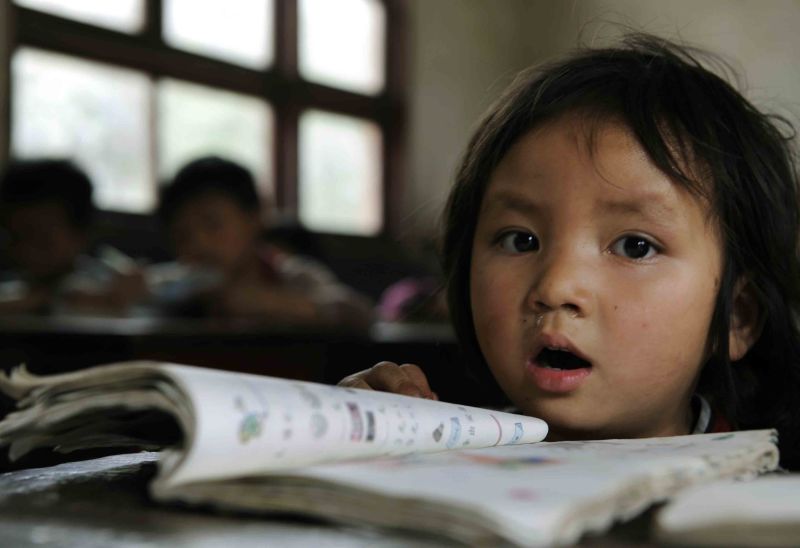


Dr. Lu Chunling, the director of the Program in Global Health Economics and Social Change at Harvard Medical School
The global population of children exposed to the risk of poor development declined by some 30 million between 2004 to 2010, and nearly 1/3 of them were from China. However, because of the huge population base, China is still ranked the third in the world as of 2011 for having the most children facing the risk of poor development.
Children’s early health development is vital to achieve a sustainable development goal. Research has shown that if young children are given good care of with factors such as enough nutrition, health care, safe environment, as well as opportunities to learn and explore the new world , they are more likely to get better economic and healthy status when they grow up. In recent years, programs to intervene poor development in young children have been conducted in countries like India, Pakistan, and Chile. The program includes encouraging mothers to have pregnancy exams, providing training for the care providers and offering free service to children from low-income families. All the measures have received visible results. It is estimated that children who have gone through the program get a 26% increase in their income when they grow up. The cost–benefit analysis is estimated 1-18. Therefore, early stage of intervention is “the best investment” in poverty alleviation.
On the other hand, the cost of not intervening will be that the children to lose 25% of their average income when they grow up. The country may face twice as much total budget in the health sector as a result.
How can we ensure more children will get benefit through the development program in China? The following measures are advised:

First of all, children’s early development shall be given high priority. Measures from the legislature, policy and fiscal level are advised to be taken to support the family care of the children.
Cases from other countries have shown that governments’ putting the matter top on their plate and enacting policy or even legislature are an important premise for children’s early development planning at a dynamic level. Infants and young children, especially those from the lower-income regions, shall be a crucial part to be considered in the system designing of the healthcare, education, jobs and social welfare.
For instance, new rules can allow new parents, especially those who work at private-owned companies and the migrant workers, to receive paid leave for taking care of their new-borns and their sick children. Nursing mothers shall be guaranteed breastfeeding breaks at work. The minimum wage rules can be used to support the income of the families with new-born babies.
Furthermore, programs such as providing free medical check-up for new-borns, free pre-school education and free nutrition food packages for children can be considered for the low-income regions. Same are methods like supplying free vaccine shots to mother and children to measure the number of the targets who require early intervening in order to improve the accuracy of the follow-up service. All these need the policy support in various sectors.
Also, enhancing the efficiency in law enforcement, strengthening resources for pre-school teachers and improving the healthcare services are also needed for ensuring the relevant legislature and policy being properly enacted.
Second is to strengthen the “Top-Down Design” so to bridge different sectors to make the framework of action plan for young children’s development.
The program will need support from multiple sectors to provide a thorough, comprehensive service for children and their families. Currently, some countries have established specific institutes to help coordinate and implement the actions from difference sectors. Some countries have one specific body representing all industries and sectors to handle young children’s development issues. China, however, is yet in short of a “Top-Down Design” like this to bridge difference sectors’ framework for joint action. Such institution is needed urgently to resolve problems such as insufficient funding and policy resources in young children’s development. The interest parties are responsible for such institution, to provide a scientific evaluation and rigid accountability system to the effect of the “intervening programs”.
Third is to enhance the construction of communities in rural areas so to ensure necessary education and healthcare is provided to the left-behind children.
China currently has over 60 million left-behind children who are the vulnerable population that needs special attentions. To solve the existing problems on the left-behind children’s’ development, the communities are needed. The projects need to be distributed to specific posts, with people taking accountabilities. The funding shall be guaranteed and the actions shall be taken.
In the future, the strongest country will be the country that invests the most in taking care of its children. Taking good care of children is a good way to start poverty alleviation. We need the whole society to work together with consensus, that is, to invest more in our children is to invest more in our future.
About the author:
Dr. Lu Chunling is the director of the Program in Global Health Economics and Social Change at Harvard Medical School. Her research focuses on measuring and analyzing global health finance and its effectiveness on population health outcomes at multiple levels. Dr. Lu has conducted research across the world, including projects in Rwanda, China, and Mexico.
Dr. Lu has been involved in a number of scientific committees, including chairing the Financial Data Tracking/Costing Working Group for the African Health Initiative of the Doris Duke Charitable Foundation, and acting as an advisor for the World Health Organization’s workshop on monitoring health service utilization and financial protection. Currently, Dr. Lu is a member of the High-Level Panel on Financing Community Health Workers, which is organized by the United Nation’s Secretary General’s Special Envoy for Health Millennium Development Goals Financing and Malaria.


 Who Will Fit The Chinese Roles In Game Of Thrones?
Who Will Fit The Chinese Roles In Game Of Thrones? China's Hubei Shennongjia added to World Heritage List
China's Hubei Shennongjia added to World Heritage List Cute Dog At Fruit Stand Becomes Latest Internet Sensation
Cute Dog At Fruit Stand Becomes Latest Internet Sensation Top 10 livable Chinese cities
Top 10 livable Chinese cities The last primitive tribe in China
The last primitive tribe in China China's first intelligent security robot debuts in Chongqing
China's first intelligent security robot debuts in Chongqing A Total of 3,552 Subscribers Vanish In Two Days; YouTube Closes All Doors to Users’ Inquiries
A Total of 3,552 Subscribers Vanish In Two Days; YouTube Closes All Doors to Users’ Inquiries Out of this world! Futuristic UFO-shaped yacht has its own garden and a stunning underwater viewing deck
Out of this world! Futuristic UFO-shaped yacht has its own garden and a stunning underwater viewing deck An old tea house in Chengdu
An old tea house in Chengdu Furious Customer Crushes All the Buns from Vendor Just Because He Was Given the Wrong Flavor
Furious Customer Crushes All the Buns from Vendor Just Because He Was Given the Wrong Flavor